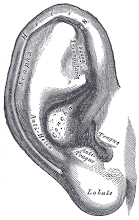I couldn't help but moan when I came across this column in the (Chicago) Daily Herald. All in all, pretty decent advice. But what is particularly irksome is this statement:
Acoustics certainly qualifies as a science, as does meteorology. Both are often accurate in their projected outcomes - but not always. Some concert halls, for example, have spent millions of dollars to enhance sound quality a few years after the buildings opened with supposedly superb acoustics.
So, acoustic physics "qualifies" as a science??? I don't think I'd be off-base by observing that Ms. St. Clair's comparison of acoustics to meteorology gives readers exactly the wrong image that we acoustics professionals wish to convey. Like many other scientists, acousticians can predict outcomes quite accurately. Certainly more accurately than meteorologists. Put simply, the more information an acoustician has about a situation, the more accurate the prediction. Contrast that with meteorology where, despite the accuracy and thoroughness of the input data, the slightest change in one of many, many variables can mean the difference between a beautiful day at the beach and blowing gales with driving rains.
Of course, when a concert hall is designed, there are many variables at play that can have an effect on the acoustics. However, they are all controllable variables; budget, mechanical design, interior finish details, seating design, stage design, et al. The predictive tools we use have been proven to be provide accurate results and desirable outcomes. A meteorologist with millions of dollar's worth of state-of-the-art prediction tools, reams of good input data, and decades of experience can go over a forecast dozens of times and still get it "wrong"; it's just the nature of that particular science. The slightest shift in wind direction can mean the predicted 4-8 inches of snow is actually only a light rain. A calm forecast with a high of 80°F can be replaced with the reality of gusty winds and 57°F. Missing the mark by such orders of magnitude is simply not something that happens in acoustics, unless there are extenuating circumstances beyond the acoustician's control or, indeed, completely beyond their awareness. If we're given all the information about a noise source, its path, and the receiver, we can typically predict the outcome with a high degree of accuracy. Certainly within industry-accepted tolerances. If we were subjected to the chaotic situations meteorologists face on a daily basis, we could hardly (for example) convince government agencies to spend millions of dollars on highway noise barriers.
As usual, I'm probably overreacting. But I find that these kinds of statements keep our science entrenched in the "voodoo" category, which is both unfortunate and unnecessary. IMHO. :)

1 Comments:
hi Jeff!
funny, my "formal" education is a BSc in atmosphere studies.
I hardly remember anything, mainly some anecdotes (a cloud's life expectancy is 90 minutes).
But, regardless of what you wrote, I find the 2 fields similar, in that they both require a good 3-D perception, a mechanical-physical grasp, and a touch for material-matter. there is the matter of intuition, but I guess that's needed in other fields as well.
thank god abstract math and high order physics are not a must (or are they? :) ).
In my case, I find that the "arts" (I paint) sort of fit in too.
so, 53 dBA, huh?
Ido Yair - Israel
Post a Comment
Subscribe to Post Comments [Atom]
<< Home